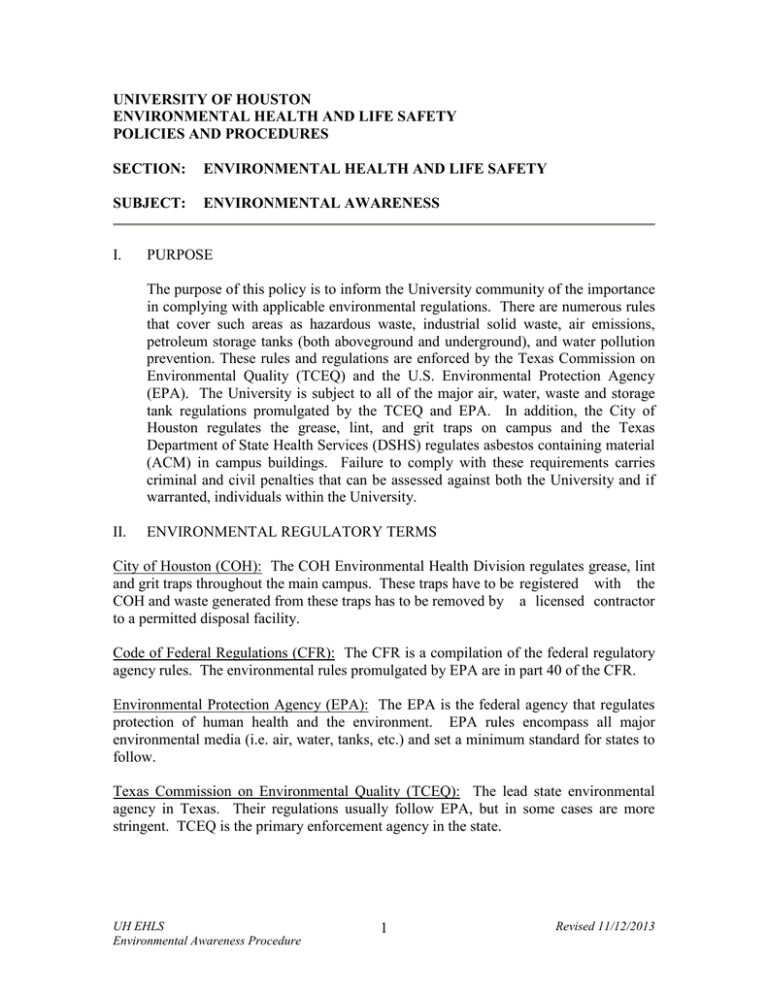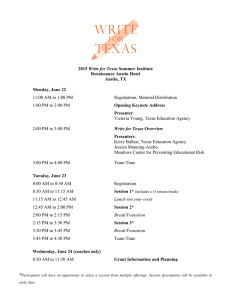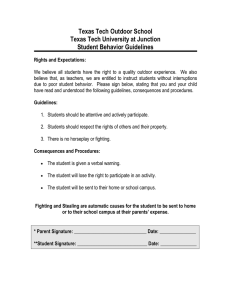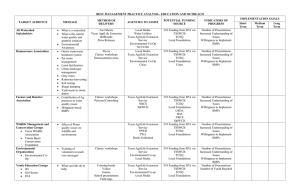UNIVERSITY OF HOUSTON ENVIRONMENTAL HEALTH AND LIFE SAFETY POLICIES AND PROCEDURES
advertisement

UNIVERSITY OF HOUSTON ENVIRONMENTAL HEALTH AND LIFE SAFETY POLICIES AND PROCEDURES SECTION: ENVIRONMENTAL HEALTH AND LIFE SAFETY SUBJECT: ENVIRONMENTAL AWARENESS I. PURPOSE The purpose of this policy is to inform the University community of the importance in complying with applicable environmental regulations. There are numerous rules that cover such areas as hazardous waste, industrial solid waste, air emissions, petroleum storage tanks (both aboveground and underground), and water pollution prevention. These rules and regulations are enforced by the Texas Commission on Environmental Quality (TCEQ) and the U.S. Environmental Protection Agency (EPA). The University is subject to all of the major air, water, waste and storage tank regulations promulgated by the TCEQ and EPA. In addition, the City of Houston regulates the grease, lint, and grit traps on campus and the Texas Department of State Health Services (DSHS) regulates asbestos containing material (ACM) in campus buildings. Failure to comply with these requirements carries criminal and civil penalties that can be assessed against both the University and if warranted, individuals within the University. II. ENVIRONMENTAL REGULATORY TERMS City of Houston (COH): The COH Environmental Health Division regulates grease, lint and grit traps throughout the main campus. These traps have to be registered with the COH and waste generated from these traps has to be removed by a licensed contractor to a permitted disposal facility. Code of Federal Regulations (CFR): The CFR is a compilation of the federal regulatory agency rules. The environmental rules promulgated by EPA are in part 40 of the CFR. Environmental Protection Agency (EPA): The EPA is the federal agency that regulates protection of human health and the environment. EPA rules encompass all major environmental media (i.e. air, water, tanks, etc.) and set a minimum standard for states to follow. Texas Commission on Environmental Quality (TCEQ): The lead state environmental agency in Texas. Their regulations usually follow EPA, but in some cases are more stringent. TCEQ is the primary enforcement agency in the state. UH EHLS Environmental Awareness Procedure 1 Revised 11/12/2013 Texas Department of State Health Services (DSHS): The lead public health agency in the state. Among issues they regulate is ACM which is commonly found in campus buildings. III. PROCEDURES The following is a generalized list of the most frequent potential environmental issues that members of the UH community may face during their daily routines. Please contact the Environmental Health and Life Safety Department (EHLS) at (713) 743-5858 with specific questions for concerns not found in this list before undertaking any activity that may trigger a non-compliance situation. 1. All hazardous waste, industrial solid waste (non hazardous), biological waste and radioactive waste must be managed through the EHLS waste program. 2. All laboratory waste must be managed through the EHLS waste program unless specific arrangements and prior approval from the EHLS are made. 3. Fume hoods will not be used to evaporate waste solvents. The Online Hazardous Waste Pickup Request Form should be used. 4. Sharps (needles, small vials) waste must be placed in the appropriate (biological, radioactive etc.) sharps container and are not to be thrown in the trash. 5. Laboratory sink or drains are not to be used for chemical waste disposal 6. The general refuse (i.e. trash) dumpsters are for empty containers, papers, packaging material, etc., and are not for liquid wastes, fluorescent light bulbs, used tires, or used oil. 7. Broken glass should be properly boxed, secured (taped), and thrown in the general refuse dumpster. 8. Electronic waste (such as computers, printers, copiers, etc.) must be disposed of through the Property Management Department. 9. Immediately report any spills or releases of suspected contaminants to EHLS at (713) 743-5858 during regular business hours and to UH Police outside of normal business hours at (713) 743-3333. 10. Changing automotive oil and discharging it to the sewer system is a violation of the Clean Water Act and should be reported directly to UH Police. UH EHLS Environmental Awareness Procedure 2 Revised 11/12/2013 11. New sources of potential air emissions such as laboratory fume hoods must be approved by EHLS prior to construction or installation. 12. Discovery of underground (or above-ground) storage tanks during a construction project must be reported immediately to EHLS. 13. Building occupants must be informed in advance of any asbestos abatement work in their respective building. 14. Regulatory officials are to be directed to the EHLS upon arrival on campus. IV. REFERENCES Title 30, Texas Administrative Code (TAC), Texas Environmental Regulations, (Texas Commission on Environmental Quality), as amended. Title 40, Code of Federal Regulations, Protection of the Environment, (US Environmental Protection Agency), July 1, 2010. UH EHLS Environmental Awareness Procedure 3 Revised 11/12/2013


